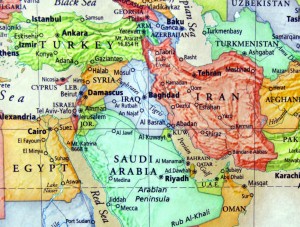Religious Nationalism A Weapon of Mass Destruction
 Photo: © Robert Hale | Dreamstime.com
Photo: © Robert Hale | Dreamstime.com It is hard to believe that the conflicts currently ravaging the Middle East could get much worse, yet the refusal of numerous parties to make substantive compromises on key issues is increasingly likely to lead to a regional conflagration that we may all come to profoundly regret.
In the United States, policymakers such as Senator Lindsey Graham (R-SC) have been chomping at the bit for expanded sanctions against Iran without regard for the diplomatic breakthrough that occurred just over a year ago and the time needed to build trust and rapport after thirty-five years of mutual hostility. Graham has also disregarded the wisdom of the United States’ Founders in separating religion from state, declaring it his religious obligation to defend indefensible Israeli policies of territorial expansion in spite of their affront to the Muslim world. He and other legislators have placed their religious beliefs or fear of the American Israel Public Affairs Committee (AIPAC) before justice for the Palestinians (not to mention U.S. national security interests). By precluding any substantive political or economic consequences for the Israeli government’s intransigence, Graham and his ilk have effectively rendered Secretary of State John Kerry’s efforts to broker a two-state solution impotent. This simply reinforces the beliefs of Muslim nations, including Iran, that only military force will change an unjust status quo.
Iranian Supreme Leader Ayatollah Ali Khamenei continues to deny the right of Israel to exist and provides support to Hamas and Hezbollah, both of which remain uncompromising in their goal of annihilating the country as a political entity. He then perpetuates the narrative of his own country’s victimization, seemingly failing to understand what basis the international community has to doubt the sincerity of his nuclear policy statements. Khamenei rails against the U.S. for inflicting injustices upon Iran while simultaneously supporting Bashar al Assad, who is responsible for the deaths of some 200,000 Syrians, as well as brutal Shi’a militias in Iraq. He does so out of the same calculations of realpolitik he damns the U.S. for, yet he apparently fails to see the irony in his self-righteous diatribes against the “Global Arrogance.”
The only way to prevent the conflicts of the Gulf and the Levant from expanding into a regional war that may very well embroil Iran, Saudi Arabia, and U.S. military forces is for policymakers on all sides to demonstrate genuine willingness to compromise and to face down the warmongers in their respective governments. These individuals cannot be permitted to hijack civilization in pursuit of their apocalyptic visions or delusions of security through perpetual hostility between the West and the Muslim world.
If the Obama administration cannot get Congress on board with a viable two-state solution, it should at least not hinder the Palestinians from pursuing a unilateral path to statehood. The current Israeli government has no intention of making the compromises necessary for a two-state solution and it is doubtful that the next one will have the incentive or domestic political support to achieve it given the vast power disparity between the two sides. By enabling Israel to spurn the Arab states’ offer of recognition, U.S. legislators reinforce the view held by Iranian leaders that justice for the United States is at best a flexible and selectively applied concept and at worst no more than a propaganda ploy to be wielded against those who challenge its power.
Iran must also moderate its policy toward Israel by offering it recognition contingent upon its achievement of a two-state solution, in line with the Arab Peace Initiative articulated twelve years ago. Some Iranian analysts have asserted that Iran would moderate its policy toward Israel after a nuclear deal between Iran and the P5+1 (the five permanent members of the United Nations Security Council—the United States, Britain, France, China, and Russia—plus Germany). This analysis seems to have it backwards, however: the U.S. has little reason to trust a state whose leader continues to champion the annihilation of Israel as a political entity. Iran need not cease its military support to the Palestinians; however, Iranian officials could decide to channel aid to groups with more moderate political objectives, to require Hezbollah to moderate its position toward Israel, and to condition aid to Hamas upon shifts in its own Israel policy. This would send a strong signal to Israeli security analysts that a nuclear agreement with Iran is in Israel’s interests and would in turn provide U.S. policymakers with greater political space to negotiate a deal. It would also strengthen Israeli and American advocates in their argument for a two-state solution as one of the keys to regional stability.
Compromise on all sides would open possibilities for investment in conventional as well as alternative and renewable sources of energy, from which Iran could benefit immensely. A decrease in tensions would strengthen arguments for a reduction in U.S. military forces in the region, improving Iran’s national security without the need for a latent nuclear weapons capability that has triggered a regional security dilemma.
Time is short to achieve such a vision. The U.S. Senate has reverted to Republican control for the next two years and the House has become more staunchly Republican, portending a shift toward more militant and uncompromising foreign policy from the U.S. Congress and less political maneuverability for an increasingly embattled Obama administration. If progress is not demonstrated, more sanctions and the threat of war will materialize in the near future. American, Iranian, Israeli and Arab leaders must not allow self-righteousness or delusions of security through perpetual hostility to lead to the spilling of more blood of their nations’ youth.
